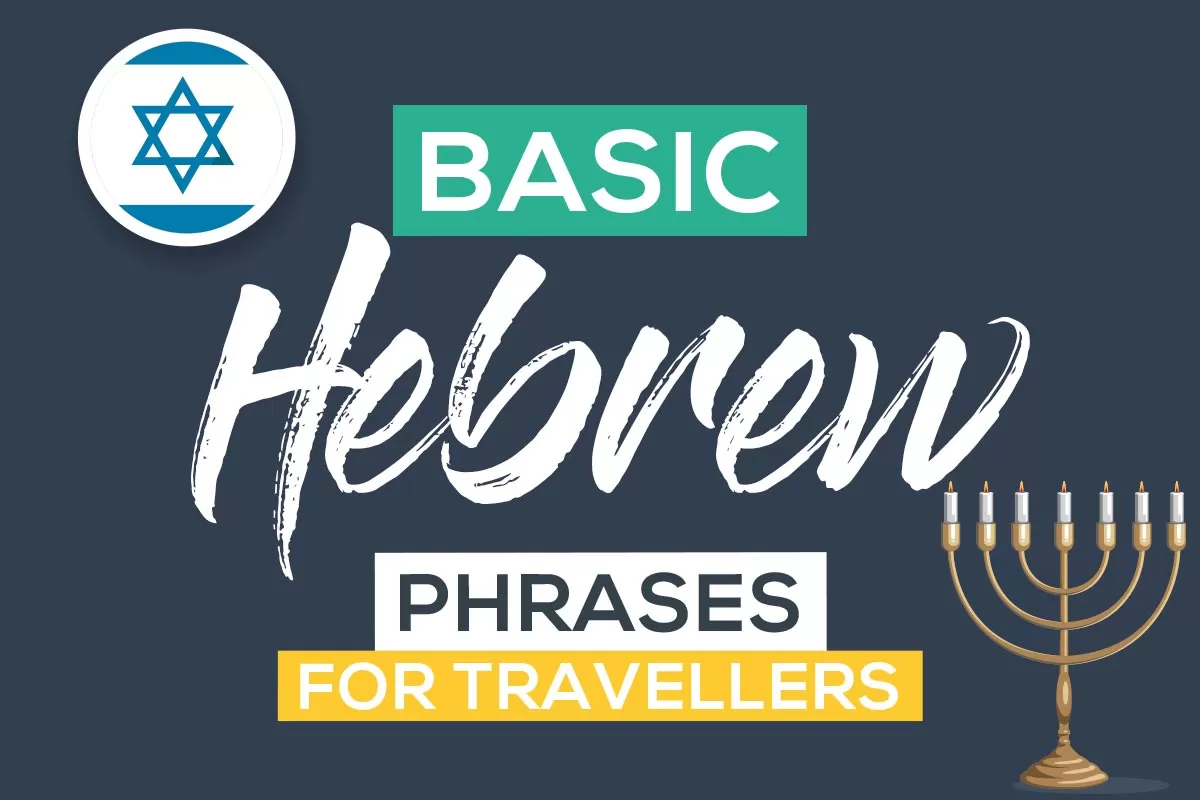Traveling to Israel but don’t speak the language? You’ve come to the right place! You do not have to learn an entire language to be travel fluent. Focus on learning a few basic Hebrew phrases and it will make all the difference. It’s a great ice-breaker and the locals will appreciate your effort. This travel phrase guide will slowly introduce you to the Hebrew language and teach you common Hebrew phrases that you can use throughout your travels.
Learning Hebrew is exciting. Here’s why! Hebrew is the ancient language of the Old Testament and the native language of Israel. What makes Hebrew so interesting is that it’s the only language from antiquity to have been successfully revived after being considered a dead language for centuries. How amazing is that?! Hebrew maintained the status of being the native language of a community, unlike Latin which still exists today but isn’t a native language.
Related: How many languages are there in the world?
A country with a fascinating history, breathtaking hills and valleys, therapeutic waters of the Dead Sea and home to some of the most important religious sites in the world, Israel is becoming an increasingly popular destination for travellers.
Though you may encounter English-speaking locals in major towns, cities and tourist sites, it’s important to remain respectful and speak the local language whenever possible.
Just like all my other phrase guides, this Hebrew travel phrase guide gives you a well-rounded set of practical phrases and vocabulary which will help you have meaningful conversations and interactions with the locals.
To help me create this new addition to my collection of free travel phrase guides, I asked my friend and Hebrew language teacher, Alisa from The Hebrew Hub to provide accurate Hebrew translations and pronunciation tips. She’s even provided audio clips for each phrase to make things even easier for you!
Want to have fun whilst learning Hebrew? Struggling to find decent Hebrew language resources? I recommend getting uTalk. Available as a desktop site and app, uTalk is awesome for learning key words and phrases in Hebrew, especially if you want to use it for travel purposes. It’s great for beginners getting started in a language and invaluable for intermediates looking to fill in gaps in their vocabulary and pronunciation.
What I love most about uTalk is that you can jump around their extensive library of topics and choose what you want to learn, when you want, and at your own pace. Because I believe in uTalk so much, I reached out to them and we’ve teamed up to offer you an exclusive 30% OFF reader discount across all of uTalk’s 140 languages! This offer isn’t available anywhere else! Click here to claim your exclusive 30% discount.
Let’s take a closer look at the Hebrew language. Here’s what we’ll cover:
Table of Contents
- Where is Hebrew spoken?
- How many people speak Hebrew?
- A Quick History of Hebrew
- Etymology: What does ‘Hebrew’ mean?
- Hebrew Alphabet, Spelling and Writing System
- Hebrew Numbers
- Hebrew Pronunciation and Dialects
- 7 Hebrew words in English You already know
- Hebrew Grammar
- 100 Basic Hebrew Phrases for Travellers with Audio
- 100 Useful Hebrew Phrases for Travel [Infographic]
Where is Hebrew spoken?
 Modern Hebrew (along with English and Arabic) became an official language in British-ruled Palestine in 1921. In 1948 it became an official language of the newly declared State of Israel. Today, Hebrew is the most widely spoken language in Israel.
Modern Hebrew (along with English and Arabic) became an official language in British-ruled Palestine in 1921. In 1948 it became an official language of the newly declared State of Israel. Today, Hebrew is the most widely spoken language in Israel.
How many people speak Hebrew?
According to figures published in 2013 by the Central Bureau of Statistics, Modern Hebrew is spoken by over nine million people worldwide.
Hebrew is also spoken in many Jewish communities around the world including in the USA (where there are more than 5 millions Jews), France (approximately 490,000 Jews) and Canada (approximately 375,000 Jews).
A Quick History of Hebrew
 Hebrew is a Semitic language that is made up of indigenous languages of the Levant, a historical geographical term referring to the areas around modern-day Syria, Lebanon, Jordan, Israel, and Palestine.
Hebrew is a Semitic language that is made up of indigenous languages of the Levant, a historical geographical term referring to the areas around modern-day Syria, Lebanon, Jordan, Israel, and Palestine.
The history of the Hebrew language is usually divided into four major periods, these include:
- Biblical or Classical Hebrew – This was used up until about the 3rd century BC. The Old Testament (along with Aramaic) was written in Classical Hebrew.
- Mishnaic, or Rabbinic Hebrew – This is the language of the Mishna (a collection of Jewish traditions), written around AD 200. Mishnaic Hebrew was never used among the people as a spoken language.
- Medieval Hebrew – Medieval Hebrew dates between 6th to 13th century AD, when many words were borrowed from Greek, Spanish, Arabic, and other languages.
- Modern Hebrew – Modern Hebrew is the official language of the State of Israel. Pre-modern Hebrew is used for prayer or study in Jewish communities around the world today.
Historically, Hebrew is regarded as the language of the Israelites and their ancestors, however, the language the term “Hebrew” was never used in the Tanakh (the Hebrew Bible).
Sometime between 200 and 400 CE in the aftermath of the Bar Kokhba revolt, the use of Hebrew as an everyday spoken language began to decline and was solely used for ritual and scholarly purposes. It wasn’t until the 19th century that Hebrew made a comeback and returned as a spoken and literary language and became the official language of the State of Israel.
Etymology: What does ‘Hebrew’ mean?
 The term “Hebrew” entered Old English from Old French Ebreu, via Latin Hebraeus, Greek Hebraios, and Aramaic ebhrai, which all derived from Biblical Hebrew. This was one of several names for the Israelite (Jewish and Samaritan) people, or Hebrews.As an ancestral name, Ebreu is believed to mean “beyond”, “other side”, as in “one from the other side [of the river/desert]”, a reference to the River Euphrates. Another explanation is that it simply meant “immigrant” from ‘ebher’, “region on the other or opposite side.”
The term “Hebrew” entered Old English from Old French Ebreu, via Latin Hebraeus, Greek Hebraios, and Aramaic ebhrai, which all derived from Biblical Hebrew. This was one of several names for the Israelite (Jewish and Samaritan) people, or Hebrews.As an ancestral name, Ebreu is believed to mean “beyond”, “other side”, as in “one from the other side [of the river/desert]”, a reference to the River Euphrates. Another explanation is that it simply meant “immigrant” from ‘ebher’, “region on the other or opposite side.”
In the 16th-century, the letter H- was added in English.
Hebrew Alphabet, Spelling and Writing System
Modern Hebrew is written from right to left using the Hebrew alphabet of 27 letters. Almost all of them are consonants, however, several letters can also function as vowels. These tend to only be signposted with a series of dots and dashes beneath words in children’s books and the Bible.
Confusingly, there is currently no standardized spelling of Israeli place names. When travelling around, it’s important to keep this in mind. Places such as Acre, can also be spelled Akko and Acco; Nathanya, Natanya, and Netanya; Elat, Elath, and Eilat; Ashqelon and Ashkelon, and so on.
| Alef | Bet | Gimel | Dalet | He | Waw/Vav | Zayin | Chet | Tet | Yod | Kaf |
| א | ב | ג | ד | ה | ו | ז | ח | ט | י | כ |
| ך | ||||||||||
| Lamed | Mem | Nun | Samech | Ayin | Pay | Tsade | Qof | Resh | Shin | Tav |
| ל | מ | נ | ס | ע | פ | צ | ק | ר | ש | ת |
| ם | ן | ף | ץ |
Hebrew Numbers
Numbers in Hebrew can be written using either the Western-adapted Arabic numbers eg. 1, 2, 3, etc. or by using letters of the Hebrew alphabet, where each letter holds a numeric value depending on its position in the alphabet. For example, א is 1, י is 10.
| Letter | Numeric value | Letter | Numeric value | Letter | Numeric value |
| א | 1 | י | 10 | ק | 100 |
| ב | 2 | כ | 20 | ר | 200 |
| ג | 3 | ל | 30 | ש | 300 |
| ד | 4 | מ | 40 | ת | 400 |
| ה | 5 | נ | 50 | ||
| ו | 6 | ס | 60 | ||
| ז | 7 | ע | 70 | ||
| ח | 8 | פ | 80 | ||
| ט | 9 | צ | 90 |
Hebrew Pronunciation and Dialects
In Modern Hebrew, the stress generally falls on the last syllable of the word. Speakers with a Middle Eastern background typically stress the guttural sound of some letters more so than those of European descent.
Hebrew doesn’t have regional dialects, however, some Hebrew-speakers may have adopted words from other countries for cultural specialties such as food, dress, and social customs.
7 Hebrew words in English
I bet you didn’t know that several Hebrew words have made their way into English. Here are 7 common Hebrew words you already know!
- Amen – In Hebrew, amen originally meant “true and solid” but today has the same meaning as in English.
- Hallelujah – From halleluya, it literally means, “praise God”.
- Sabbath – Sabbath means “day of rest” which is where we get the word sabbatical from meaning, a year of rest. These all stem from Hebrew name for Saturday, shabbat.
- Messiah – Comes from the Hebrew mashiakh, which means “anointed with oil”, a part of the Israelite coronation rite.
- Bedlam – The word bedlam derives from the town of Bethlehem (a transliteration of the Hebrew name of the town, Beit Lekhem), meaning complete disorder. It later became to mean “insane asylum,” after London’s most notorious insane asylum – the Hospital of St. Mary of Bethlehem.
- Cider – Shekhar means a ‘strong drink’ but has now come to mean a very specific kind of alcoholic drink made by crushing fruit, typically apples.
- Jubilee – Jubilee and jubilation are a transliteration of the word yovel – a biblical concept relating to the redistribution of wealth and liberation of slaves every 50 years.
Hebrew Grammar
It might be surprising to hear that Hebrew shares similar characteristics with English. For example, Hebrew follows the subject verbs, and object sentence structure and also uses simple verb tenses: past, present, and future.
Unlike English however, every noun in Hebrew has a gender – masculine or feminine (there is no neutral gender). This is something you might be familiar with if you’ve studied languages such as French, Italian, Portuguese, Spanish.
To help identify the gender, as a general rule, if a word ends in – ת or ה-, it’s most likely feminine. Otherwise, its gender is most likely masculine.
In Hebrew, there is no way to say or write, ‘a’ or ‘an’, also known as an Indefinite article. This is simply implied. Hebrew also only uses one article; a definite one. For example, the house, the door. On top of that, there is no masculine or feminine version of the definite article, the same word is used with all nouns.
100 Common Hebrew Phrases for Travel

Want the infographic to take with you? Scroll to the bottom of the page and save it or pin it.
Hebrew Translation | Pronunciation | |
|---|---|---|
Greetings | ||
| Hello (greet someone) | !שלום | shalom! |
| Good morning | !בוקר טוב | boker tov! |
| Good night | !לילה טוב | layla tov! |
| Good evening | ערב טוב | erev tov! |
| Goodbye | להתראות | lehitraot! |
| How are you? | ?מה נשמע | ma nishma? |
| I’m am very well, thank you | !מצוין, תודה | metzuyan, toda! |
| Good, thank you | טוב, תודה | tov, toda! |
| What is your name? | ?איך קוראים לך | eikh kor’im lekha (m.)? / eikh kor’im lakh (f.)? |
| My name is… | …קוראים לי | kor’im li … |
| It’s nice to meet you | נעים מאד | naim meod |
Essentials | ||
| Please | בבקשה | bevakasha |
| Thank you | תודה | toda |
| You’re welcome | בבקשה | bevakasha |
| OK | בסדר | beSeder |
| Excuse me | סליחה | slikha |
| I’m sorry | אני מצטער\ת | ani mitztaer (m.) ani mitztaeret (f.) |
| I don’t understand | אני לא מבין\ה | ani lo mevin (m.) ani lo mevina (f.) |
| I only speak a little bit of Hebrew | אני מדבר\ת עברית רק קצת | ani medaber/et (m./f.) ivrit rak ktzat |
| Can you please repeat that slowly | תגיד\י את זה לאט, בבקשה | tagid/i (m./f.) et ze leat, bevakasha |
Questions | ||
| Where? | ?איפה | eifo? |
| How? | ?איך | eikh? |
| Where is/are…? | ?…איפה | eifo …? |
| How much? | ?כמה | kama? |
| Who? | ?מי | mi? |
| When? | ?מתי | matai? |
| Why? | ?למה | lama? |
| What? | ?מה | ma? |
| Which? | ?איזה | eize? |
| How much is this? | ?כמה זה | kama ze? |
| How much does that cost? | ?כמה זה עולה | kama ze ole? |
| Where is the toilet? | ?איפה השירותים | eifo haSherutim? |
| Can I have… | …אפשר בבקשה | efshar, bevakasha … |
| I would like… | …הייתי רוצה | hayiti rotze … (m.) hayiti rotza … (f.) |
Food and Drink | ||
| The menu, please | תפריט, בבקשה | tafrit, bevakasha! |
| Two beers, please | שתי בירות, בבקשה | shtei birot, bevakasha! |
| A bottle of house white/red wine, please | בקבוק יין לבן\אדום, בבקשה | bakbuk yain lavan/adom, bevakasha! |
| Some water, please | מים, בבקשה | mayim, bevakasha! |
| I’m allergic to… | -יש לי אלרגיה ל | yesh li alergiya le-… |
| I’m a vegetarian | אני צמחוני | ani tzimkhoni (m.) ani tzimkhonit (f.) |
| Can we have the bill, please? | ?אשפר חשבון, בבקשה | efshar kheshbon, bevakasha! |
| What do you recommend? | ?מה אתה ממליץ לי | ma ata mamlitz li? (addressing a male) ma at mamlitza li? (adressing a female) |
| The meal was excellent | !היה ממש טעים | haya mamash taim! |
Getting Around | ||
| Left | (שמאל(ה | smol(a) |
| Right | (ימינ(ה | yamin(a) |
| Straight ahead | ישר | yashar |
| Turn left | שמאלה | smola |
| Turn right | ימינה | yamina |
| Bus stop | תחנת אוטובוס | takhanat otobus |
| Train station | תחנת רכבת | takhanat rakevet |
| Airport | שדה תעופה | s’de teufa |
| Entrance | כניסה | knisa |
| Exit | יציאה | yetzia |
Numbers | ||
| 0 | אפס | efes |
| 1 | אחת | akhat |
| 2 | שתיים | shtayim |
| 3 | שלוש | shalosh |
| 4 | ארבע | arba |
| 5 | חמש | khamesh |
| 6 | שש | shesh |
| 7 | שבע | sheva |
| 8 | שמונה | shmone |
| 9 | תשע | tesha |
| 10 | עשר | eser |
| 11 | אחת עשרה | akhat estre |
| 12 | שתים עשרה | shteim esre |
| 13 | שלוש עשרה | shlosh esre |
| 14 | ארבע עשרה | arba esre |
| 15 | חמש עשרה | khamesh esre |
| 16 | שש עשרה | shesh esre |
| 17 | שבע עשרה | shva esre |
| 18 | שמונה עשרה | shmone esre |
| 19 | תשע עשרה | tsha esre |
| 20 | עשרים | esrim |
| 30 | שלושים | shloshim |
| 40 | ארבעים | arbaim |
| 50 | חמישים | khamishim |
| 60 | ששים | shishim |
| 70 | שבעים | shiv’im |
| 80 | שמונים | shmonim |
| 90 | תשעים | tish’im |
| 100 | מאה | mea |
| 1000 | אלף | elef |
Time | ||
| Today | היום | ha-yom |
| Tomorrow | מחר | makhar |
| Yesterday | אתמול | etmol |
| What time is it? | ?מה השעה | ma ha shaa? |
| It’s … | …זה | ze… |
Days | ||
| Monday | יום שני | yom sheni |
| Tuesday | יום שלישי | yom shlishi |
| Wednesday | יום רביעי | yom revii |
| Thursday | יום חמישי | yom khamishi |
| Friday | יום שישי | yom shishi |
| Saturday | שבת | shabat |
| Sunday | יום ראשון | yom rishon |
Emergency | ||
| Help! | !הצילו | hatzilu! |
| I need a doctor | אני צריך\ה רופא | ani tzarikh rofe (m.), ani tzrikha rofe (f.) |
| I don’t feel well | אני לא מרגיש\ה טוב | ani lo margish tov (m.), ani lo margisha tov (f.) |
| Call the police! | !תתקשרו למשטרה | titkashru le-mishtara! |
| There’s a fire! | !שריפה | srefa! |
Want to learn more? Watch Alisa’s Hebrew Crash Course on YouTube.
Useful Hebrew Phrases and Words for Travellers [Infographic]
Like it? Pin it for later!

Sources / A big thanks to Alisa Zingerman from The Hebrew Hub for the translations / BBC / Wikipedia / Britannica / Haaretz / Hebrewpod101
Want to know more about learning languages? Start here!
- How to Learn Your First Foreign Language in 8 Simple Steps: A Beginner’s Guide
- Language learning tips: 11 Polyglots Reveal The Secrets of Their Success
- Top Language Learning Resources You Should Use
- 11 Life-Changing Reasons Why You Should Learn a Language
- 42 beautiful Inspirational Quotes for Language Learners
- Top 10 Best Ways to Learn a Language Better and Faster
Over to you!
Which of these Hebrew phrases did you find the most useful? Let me know using the comments section below or join me on social media to start a conversation.
Thanks for reading and I hope you enjoyed this post.
Like what you see? Subscribe using the form below to have all of my posts delivered directly to your email.

